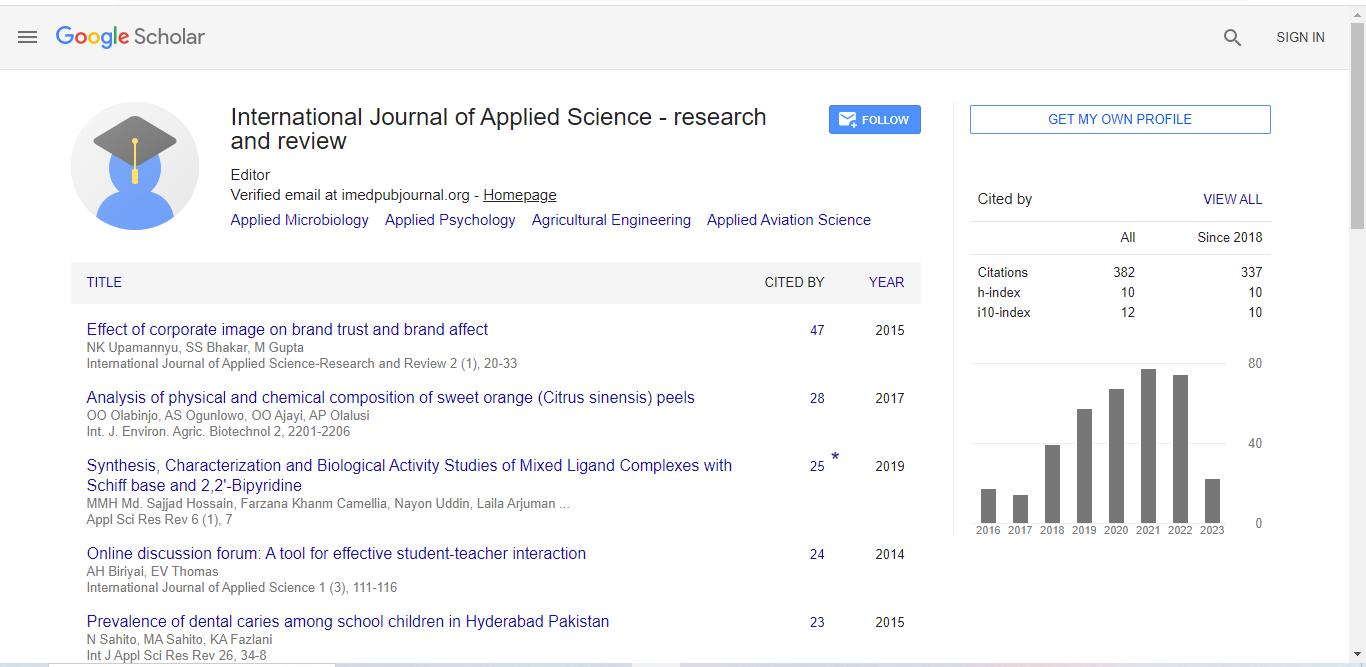Perspective - (2023) Volume 10, Issue 6
Antibiotic Resistance: A Growing Global Health Threat
Sun Jin Hur*
Department of Applied Science, Seoul National University, Seoul, Korea
*Correspondence:
Sun Jin Hur, Department of Applied Science, Seoul National University, Seoul,
Korea,
Email:
Received: 14-Jun-2023, Manuscript No. IPIAS-23-17757;
Editor assigned: 19-Jun-2023, Pre QC No. IPIAS-23-17757 (PQ);
Reviewed: 03-Jul-2023, QC No. IPIAS-23-17757;
Revised: 01-Sep-2023, Manuscript No. IPIAS-23-17757 (R);
Published:
29-Sep-2023, DOI: 10.36648/2394-9988-10.4.34
Introduction
Antibiotics have revolutionized modern medicine, saving
countless lives by effectively combating bacterial infections.
However, the misuse and overuse of these powerful drugs
have led to the emergence of antibiotic resistance, a pressing
global health concern. Antibiotic resistance occurs when
bacteria evolve and develop mechanisms to withstand the
effects of antibiotics, rendering them ineffective. This
phenomenon poses a significant threat to public health, as it
limits treatment options, increases the risk of prolonged
illness and escalates healthcare costs. This article explores the
causes, consequences and potential solutions to the growing
problem of antibiotic resistance. Antibiotic resistance arises
due to several factors, primarily driven by human activities.
One major cause is the over-prescription and misuse of
antibiotics. Many individuals demand antibiotics for viral
infections, for which these drugs are ineffective, contributing
to the development of resistant strains. Additionally,
antibiotics are often used in agriculture to promote animal
growth and prevent diseases, leading to the widespread
exposure of bacteria to these drugs.
Description
The incomplete course of antibiotic treatment is another
critical factor. Patients sometimes stop taking antibiotics once
they feel better, without completing the full prescribed
course. This incomplete exposure allows bacteria to survive,
adapt and develop resistance. Poor infection control practices
in healthcare settings, such as inadequate hand hygiene and
improper disinfection protocols, also facilitate the spread of
resistant bacteria. Antibiotic resistance has far-reaching
consequences on multiple levels. From an individual
perspective, it increases the risk of prolonged illness, treatment failure and higher mortality rates. Infections caused
by resistant bacteria are more difficult to treat, often
requiring more potent antibiotics or a combination of drugs,
which may have more severe side effects.
At the population level, antibiotic resistance leads to
increased healthcare costs. Patients with resistant infections
require longer hospital stays, more frequent doctor visits and
expensive medications. This places a tremendous burden on
healthcare systems, limiting the resources available for other
essential medical needs. Furthermore, the economic impact
extends beyond healthcare, affecting productivity and leading
to lost workdays and decreased economic output. The global
impact of antibiotic resistance is profound. It threatens to
undo decades of medical progress, rendering once-treatable
infections incurable. Routine medical procedures, such as
surgeries, chemotherapy and organ transplants, become
riskier due to the heightened vulnerability to infection. The
post-antibiotic era, where even minor infections could
become life-threatening, looms as a real possibility if urgent
action is not taken. Tackling antibiotic resistance requires a
multifaceted approach. Firstly, there is a need for improved
surveillance and monitoring systems to track the prevalence
of resistant bacteria and identify emerging hotspots. This
information can guide public health interventions and inform
treatment guidelines.
Conclusion
Education and awareness campaigns are crucial in promoting
responsible antibiotic use. Physicians, patients and the
general public must be educated about the appropriate use of
antibiotics, emphasizing that these drugs are ineffective
against viral infections. Enhanced infection prevention and
control measures in healthcare settings, including strict
adherence to hand hygiene protocols, proper sterilization techniques and prudent antibiotic prescribing, can help
reduce the transmission of resistant bacteria. Furthermore,
research and development efforts must focus on discovering
new antibiotics and alternative treatments. Incentives for
pharmaceutical companies to invest in antibiotic
development, as well as collaboration between academia,
industry and government agencies, can accelerate the
discovery of novel drugs and therapies. International
cooperation is vital in addressing antibiotic resistance.
Governments, healthcare organizations and regulatory bodies
need to work together to develop and implement policies that
promote responsible antibiotic use, restrict the use of
antibiotics in agriculture and encourage the development of
new antibiotics. Antibiotic resistance is a pressing global
health crisis that requires immediate attention and action. By understanding the causes and consequences of antibiotic
resistance, implementing effective strategies for prevention
and control and investing in research and development, we
can combat this threat. Preserving the efficacy of antibiotics is
essential for maintaining modern healthcare standards,
protecting vulnerable populations and ensuring a future
where bacterial infections remain manageable. By taking
collective responsibility and acting now, we can safeguard the
effectiveness of antibiotics for generations to come.
Citation: Hur SJ (2023) Antibiotic Resistance: A Growing Global Health Threat. Int J Appl Sci Res Rev. 10:34.
Copyright: © 2023 Hur SJ. This is an open-access article distributed under the terms of the Creative Commons Attribution
License, which permits unrestricted use, distribution, and reproduction in any medium, provided the original author and
source are credited.

